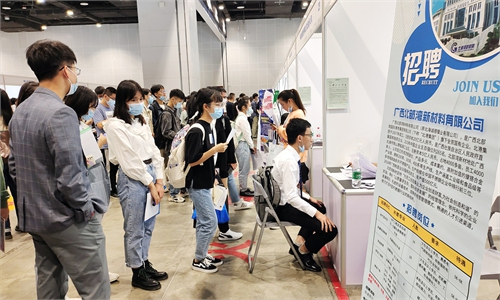Shanghai universities, companies join hands to stabilize jobs in toughest employment year

Job seekers view employment information during a job fair in Lhasa, southwest China's Tibet Autonomous Region, Aug. 20, 2019. (Xinhua/Li Xin)
Although the Omicron epidemic in Shanghai has disrupted the normal job-hunting process of college graduates, universities in Shanghai are making every attempt to match and keep graduates and their potential employers in touch, even while both are confined to their homes or compounds, in response to the toughest-ever employment environment.
The citywide "static management" in Shanghai since the end of March has made it impossible for local college students to have in-person interviews with potential employers. But local colleges have managed to establish platforms for both to communicate and carry out the two-way selection.
A record-high 10.76 million graduates - an increase of 1.67 million year-on-year - are about to leave campus this summer and find a job in the face of multiple pressures posed by the COVID-19 epidemic and structural contradictions in the China's labor market.
The number of college graduates in Shanghai this year is expected to reach 217,000, 10,000 more than in 2021, Wu Nengwu, an official from the Shanghai Municipal Education Commission, said during a forum last December.
During the closed-loop management, the prestigious Fudan University in Shanghai has coordinated multiple departments in promoting graduate employment.
The university has made full use of its alumni resources to help fresh graduates find jobs. The alumni association has cooperated with the campus career center to hold job fairs and sponsor online lectures by elite alumni about industry information and guidance on career planning, targeting topics including the digital economy, emerging technology, government and enterprise management, biomedicine and financial consulting.
During the online job fairs held on April 14 and 15, a total of 120 companies associated with the university's alumni offered 3,192 positions, which covered all the graduates' and post-graduates' majors. Over 80 percent of the companies are based in first-tier cities such as Beijing, Shanghai, and Guangzhou and Shenzhen in South China's Guangdong Province.
Another top university in the city, Shanghai Jiao Tong University, has explored talent training and scientific research models by establishing internship bases through cooperation between the university and enterprises, in a bid to promote higher-quality employment for graduates.
A staff member surnamed Wang at the School of International and Public Affairs of Shanghai Jiao Tong University told the Global Times on Thursday that the university has tried to make the most of its alumni resources, reaching internship cooperation with enterprises whose owners are the university's alumni or where many alumni work.
The traditional Chinese medicine (TCM) sector has been playing an important role in combating COVID-19 in China over the past two years. Being the major talent pool for TCM, the Shanghai University of Traditional Chinese Medicine held a series of online fair jobs between April 11 and 15, providing over 2,000 positions from 560 companies, including some major TCM producers.
The university will continue to organize online campus recruitment events in May, providing two-way selection platforms for the fresh graduates and medical institutions.
"The graduates of public health and preventive medicine majors have been popular in the job market over the past two years, particularly during this outbreak. The university has cooperated with various resources to promote employment and rolled out a series of online services and guidance activities to help polish students' resumes and give them instructions for job interviews," Zhang Ying, deputy director of the department of student affairs with the Shanghai University of Traditional Chinese Medicine, told the Global Times on Thursday.
A student named Guo Chaoyang from the university's School of Rehabilitation Science told the Global Times that he felt particular appreciation for his mentor and his school's efforts in contacting employment resources in his hometown in Hohhot, North China's Inner Mongolia Autonomous Region, where he wants to return to live and work after graduation.

